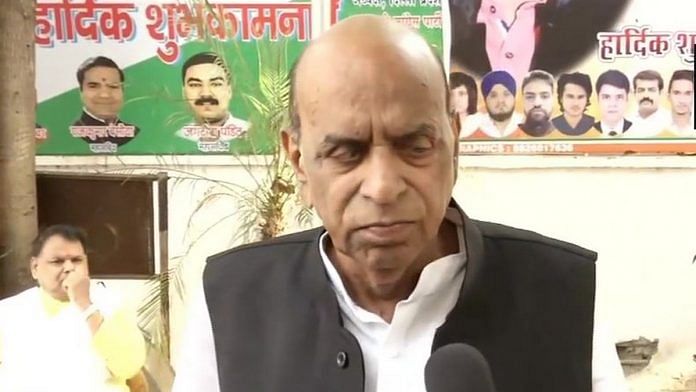New Delhi: When former prime minister Indira Gandhi declared Emergency in 1975, Devi Prasad Tripathi, the Nationalist Congress Party leader who died Thursday, was the president of the students’ union at Jawaharlal Nehru University.
“It was he who stood up to the ruling dispensation and said they needed to take students’ protests more seriously,” says Vinod Sharma, a journalist and close friend of Tripathi.
Soon after, Tripathi was thrown into jail with the likes of former finance minister Arun Jaitley. But his commitment to democratic ideals never left him.
In 2006, as the democracy movement took shape in Nepal, Tripathi was part of the Nepal Solidarity Committee, a delegation of Indian politicians that visited the county, along with the CPI’s Sitaram Yechury, the CPM’s D. Raja and the late socialist thinker and activist Surender Mohan.
“I still remember that he gave the keynote address,” D. Raja tells ThePrint. “He told them, you are fighting against your king. We have brought with us democratic Raja (king), a pun on my name.”
A former aide of Rajiv Gandhi who later left the Congress to help launch the NCP, a lover of Faiz Ahmed Faiz’s poetry, Tripathi donned many hats and was known to be very articulate and a forceful orator.
Tripathi died Thursday at the age of 67, after a prolonged illness. ThePrint looks back at the politician who straddled both the literary and the political world.
From SFI to Congress to NCP
Tripathi’s political career spanned over four decades. He started as a student politician in JNU where he won the president post while being associated with the Students Federation of India.
But after Indira’s death, and with the rise of her son and former prime minister Rajiv Gandhi, it was the Congress that Tripathi chose to align with at the national level.
“There was this immense hope when Rajiv Gandhi came to power,” says Vinod Sharma. “He (Tripathi) believed in him.”
Tripathi acted as a political aide to Rajiv and managed his constituency, Amethi.
The test, however, came in 1999 when interim Congress chief Sonia Gandhi’s name was being floated as the next prime ministerial candidate. Tripathi was opposed to the idea.
“He was opposed to Soniaji at the time because of her foreign origins,” recalls senior Congress leader, and his former colleague at the NCP, Tariq Anwar.
It was around the time that the Congress split and NCP chief Sharad Pawar formed his own party. Tripathi too joined him and remained the spokesperson and general secretary of the party until his death.
His first and only term in the Rajya Sabha began in 2012 and went on till 2018. His farewell speech where he invoked Kalidas and highlighted how Parliament never debated on judiciary, media, women and sex, is hailed by many as his crowning moment.
Also read: Importance of Ajit Pawar — why all is forgiven and the NCP leader is deputy CM again
Love for Faiz and Ghalib’s poetry
It was in 1978 that Tripathi first met the author of “revolution and romance”, Faiz Ahmed Faiz. He had then recited a couplet to Faiz that he composed during Emergency — “Hai khabar ki koi khabar hi nahi hai, hai darr itna ki koi darr hi nahi hai (The news is that there is no news at all, so much is the fear that there is no fear at all)”.
“Faiz heard him and said, barkhurdaar, bahut acha likha hai, aur likha karo (This is very well written, you must write more),” Sharma tells ThePrint.
And that was the beginning of a long-standing friendship between the two.
Tripathi’s love for literature is so well known that his friends can’t ever remember him mentioning just one favourite book. From Faiz to Raghuveer Sahai to John Keats to W.B. Yeats, he had a line of poetry for every occasion, they say.
This, despite the fact that Tripathi suffered from a congenital defect that only allowed him to read when he brought the text really close to his eyes.
“He was extremely well-read and very active despite the limitations of his health,” says Anwar.
Tripathi could seamlessly weave through the Upanishads with his knowledge of western philosophy. “I remember he would quote Sanskrit couplets in the Rajya Sabha,” says Raja. “I don’t really understand Sanskrit but he was so articulate it was hard not to pay attention.”
For many, Tripathi was the ideal amalgamation of intellect and politics and a connoisseur of fine spirits.
He had not been keeping well, and was released from hospital after treatment two months ago. But he was undeterred, a friend recalls.
“We met at his house. He was a connoisseur of literature and his drink. And even though the doctors told him it would be his nemesis, his answer was simple: Ghalib,” says the friend, asking not to be identified.
“Go hath ko jumbish nahi aankho mein toh dum hai, rehne do abhi sagar-o-meena mere aage (Even though there is no strength in my hands, my eyes are still sharp. Let that wine and cask stay in front of me).”
Also read: Not just in Jharkhand, Amit Shah’s ‘Chanakya Niti’ has faltered in other states too




These are the good people who come out of institutions like JNU. Rest in peace.